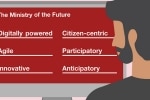
GCC countries, along with other oil-dependent economies, are experiencing dual shocks: the COVID-19 pandemic and lower oil prices. In response, GCC governments must act swiftly to contain and minimize the disruption, mitigate risks, build capabilities for the eventual recovery, and adapt their tactics for economic transformation and sustainable growth.
The dual shocks, and the necessary containment measures, have halted the GCC’s economic life, which are highly dependent on imports. Supply-side problems and disruptions to global value chains are hindering production. Closures and travel bans are making matters worse — reducing productivity, employment, and output. Dependent on oil, state revenues are dropping significantly by around $500 million a day should prices persist at around $20 per barrel.
GCC governments can contain the crisis and mitigate risks with three sets of action: mobilizing against the pandemic, stabilizing through economic lifelines, and strategizing for the recovery.
First, governments should mobilize proactive and reactive warning and monitoring systems to improve public health by testing, containing, and treating the effects of COVID-19. Along with medical interventions, governments can reward those on the healthcare frontline, and use behavioral interventions that “nudge” citizens to adopt healthy behaviors.
Second, governments should stabilize the population, businesses, and financial institutions through economic lifelines, with stimulus packages thus far worth $122 billion. GCC governments have initiated income protection measures for households. They are enhancing consumer protection by prohibiting price increases. For businesses, governments should extend immediate help to firms in the most affected sectors, such as retail, banking, air transport, hospitality, and non-food manufacturing.
However, stabilization measures must be consistent with long-term economic priorities. There must be conditions on financial assistance to reinforce social safety nets. So while governments are helping firms out of the credit crunch and seeking to prevent insolvencies, they must avoid subsidies with little impact on output, or that help uncompetitive sectors, or that will persist after the crisis. Funds should be conditional on business recovery plans that sustain employment and social protection, ensure business continuity and increased outputs, prepare for the recovery, and lead to impact, innovation, and resilience.
Governments must continue reforming their governance as this makes extending assistance easier. Processes must become more flexible and procurement faster, so government bodies can mobilize demand and resources faster. This applies in particular to established funds for small firms, industry, and rural areas. Of course, small companies need more than money. They would benefit from sector specific advice (such as on retail operations during containment) and access to digital services and platforms.
Third, governments must strategize for a sustainable recovery. Their short-term response must be consistent with medium-term plans, in particular through developing their macroeconomic, fiscal, trade and labor growth policies, fostering innovation, and encouraging private sector participation. GCC governments must lower barriers to enterprise and industrial development to promote localization of supply chains that they desperately need as this crisis has demonstrated.
Governments must be ready to re-focus their national priorities, and reform their agendas, and reconsider expenditures and investments. They should establish post-crisis innovation funds and build links between small firms and research organizations. They should encourage urban innovation and experimentation labs, and enhance national competitiveness by promoting such sectors as renewable energy, life sciences, digital, and intelligent automation in industry.
GCC governments must institutionalize the recovery process. This starts with setting up a post-crisis recovery unit with a clear mandate, that is empowered to take action, has access to sustained funding and to the highest level of decision-makers.
An important part of strategizing is building government capabilities. GCC governments need foresight capabilities so that they can anticipate any potential emerging issues. They need data surveillance and analytics that will enhance decision making. These will ensure that initiatives are well-targeted. To judge the efficacy and impact of recovery programs, governments need impact assessment capabilities.
Above all, governments must engage more effectively with their constituents. GCC governments should create community engagement platforms to engage with citizens and businesses and solicit their views. They need to be able to grasp concerns and be able to respond, and should not hesitate to use targeted communication messages and channels and surveys.
By acting now, GCC governments can prepare for the recovery and keep their long-term economic development on track.
This article originally appeared in April 2020 on Gulf Business.
About the authors
Dr. Yahya Anouti and Dr. Raed Kombargi are partners with Strategy& Middle East, part of the PwC network.
Contact us






















Menu